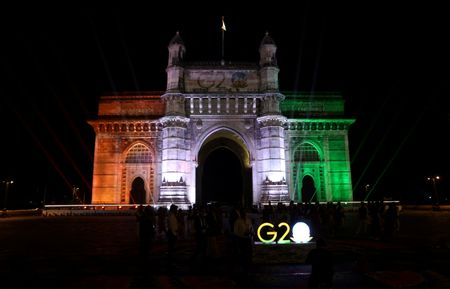By Aftab Ahmed and Christian Kraemer
NEW DELHI (Reuters) – G20 finance and central bank chiefs meet in India next week at the first-year anniversary of Russia’s invasion of Ukraine to discuss rising debt troubles among developing countries, the regulation of cryptocurrencies and the global slowdown.
The Feb. 22-25 meeting in the Nandi Hills summer retreat near Bengaluru is the first major event of India’s G20 presidency and will be followed by a March 1-2 meeting of foreign ministers in New Delhi.
As global borrowing costs rise, India – whose neighbours Sri Lanka, Pakistan and Bangladesh have all sought International Monetary Fund support in recent months – wants to put debt relief at the forefront of discussions at the finance talks.
It is drafting a proposal for G20 countries to help debtor nations badly hit by the economic impact from the pandemic and the Ukraine war, by asking big lenders including China to take a large haircut on loans, Reuters reported on Wednesday.
New Delhi also supports a push by the IMF, the World Bank and the United States for the so-called Common Framework (CF) – a G20 initiative launched in 2020 to help poor countries delay debt repayments – to be expanded to include middle-income countries, though China has resisted.
“We support exploring a possible extension of the CF to middle-income countries facing debt vulnerabilities,” said a European Union paper, signalling its backing for such moves ahead of the meeting.
The World Bank said in December the world’s poorest countries owed $62 billion in annual debt service to bilateral creditors, a year-on-year increase of 35%, triggering a higher risk of defaults. Two-thirds of the debt burden is owed to China, the world’s largest sovereign creditor.
For India, the other priority is to agree on global rules for cryptocurrencies. India’s central bank governor said last year cryptocurrencies were a “huge threat” to economic and financial stability” and some officials even called for a ban.
The country is now keen on international views on it.
“Crypto assets are by definition borderless and require international collaboration to prevent regulatory arbitrage,” India’s Ministry of Finance told parliament this week.
“Therefore, any legislation for regulation or for banning can be effective only with significant international collaboration on evaluation of the risks and benefits and evolution of common taxonomy and standards.”
The meeting comes amid attempts to ensure that sanctions on Russia do not deprive nations like Sri Lanka, Zambia and Pakistan – whose economies are still struggling to recover from the pandemic – access to vital oil and fertilizer supplies.
After a video call between Indian Finance Minister Nirmala Sitharaman and IMF Managing Director Kristalina Georgieva last week, New Delhi said it had asked the global lender to work on policy guidance to ensure energy and food security.
“Food shortages and higher food and fertiliser prices triggered by the war are exacerbating global food insecurity, which disproportionately affects the most vulnerable,” the EU paper said, urging the G20 to step up efforts to address the problem.
Neither the Russian finance minister nor the central bank chief were expected to attend the meeting.
(Writing by Krishna N. Das; editing by Mark John and Jonathan Oatis)

